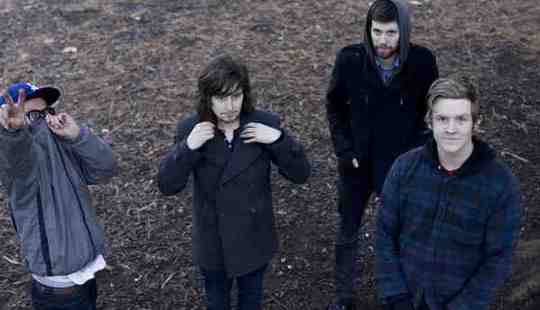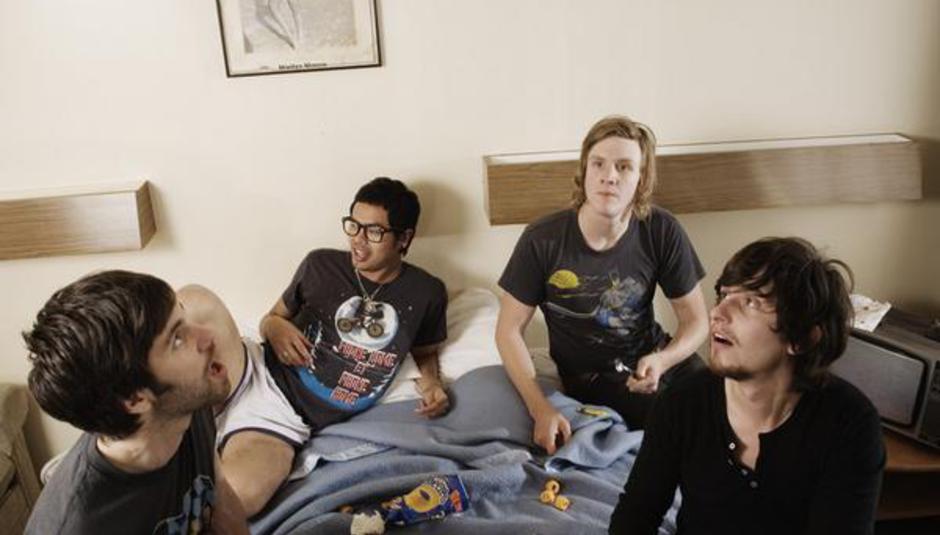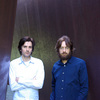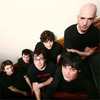Note: This article was originally published on February 19th 2009 but as The Temper Trap play the DiS stage at Great Escape and as DiS' editor is interviewing Korda Marshall as part of the conference we thought we'd bump this to the frontpage.
The idea of this Freshly Inked column is that we speak to the A&R or label boss responsible for signing a new act. The aim is to find out more about the band, how they found them, why they've signed them, their vision for the band and all that sort of stuff. In this special edition of Freshly Inked, DiS caught up with former Warner Brothers MD and the man who started Infectious Records, whose career has involved everyone from Muse to Sea Sick Steve via Symposium (one of your humble scribe's favourite bands), Ash, Take That, Garbage and The Enemy.
DiS founder and label boss Sean Adams went for a pint of Guinness and a packet of crisps with a hoodie-wearing Korda Marshall to find out more about The Temper Trap, the first signing to his new "music company" and to find out what his plans are for this new company.
Sean: How did you discover Temper Trap?
Korda: It's kinda complicated and simple. When I left Warners, I was gonna retire and for the first three or four weeks and I was just gonna go sailing. And then, my daughter, who's a booking agent at CAA [one of the world's biggest agencies], had one of her new bands called General Fiasco supporting One Night Only at the Astoria and she wanted me to go see them. After the show, my two kids dragged me off to Borderline to see a band which Michael Gudinski (founder of Mushroom Records) had found and signed. To be honest, I kinda stood there relatively bored and waiting to go home.
They did the first intro bit as an instrumental but the playing was really strong. Halfway through that first song, Dougie, who's the singer, walked on and opened his mouth and the voice of an angel came out!
I was intrigued, I managed to get hold a CD and I went to see them play again the following night and was absolutely bowled over. Then I met the band the following lunchtime and started chatting. I very quickly came to the realization that with an act as really-really great as that, I could start a new record company or rather, start a new music company. So I suddenly got very excited, having spent four weeks sitting around wanting to go sailing. I just thought, if I've got a great act there's a reason to start a new company. The week after that I flew down to Australia to spend some time with them, to get to know them better.
You've worked with a lot of Australian bands haven't you?
Yeah, I used to run Mushroom Records for about 10 years and my label Infectious Records was a division of Mushroom from about '94. And then Mushroom was bought by Warners. It was a big independent label in Australia, big like Virgin Records was and they had a lot of big commercial sense but also a lot of credible music. Here in the UK we had a lot of success with Peter Andre and it allowed us to spend lots of money on developing and marketing Muse, Ash and Garbage and Zero7 and Paul Oakenfold and what have you...
You recently left Warners, did you envisage you'd ever be running a label again?
It's crazy, I'd been working non-stop, every day, y'know, twenty five hours a day for twenty six years and I thought that was it for me. After seeing The Temper Trap, things changed. I thought if I was gonna work in music again I'd head down to Australia and take some time out and catch up with friends, I'd see the band and see what happens.
During that time I had some approaches to put some money into a new company. I told them I'd found this new band I was really excited about and they agreed to put some money in. So I continued to take some time off, I went skiing and sailing but would drop into internet cafes. We went backwards and forwards by email sorting out the deal with the band, and with some consultants for the business.
I came back [to the UK] a few weeks ago and it's all up and running. We haven't got an office and we might not have one. The tag-line is 'make it up as you go along' records. We've got some really good ideas and visions and we're looking for new artists as we've put together a very professional set-up and there's finance around things. However, the key thing for me is to have a lot of fun.
How did you originally start Infectious?
When I left RCA in '93, I spent three months trying to get a job and discovered I wasn't right for the major labels because I didn't 'give good corporate head'. I was far closer to the artistes and the musicians, and far more interested in the music and the aesthetics than the commercial side and the politics.
So, yeah, I left RCA under a cloud and started Infectious in '94 with Pop Will Eat Itself, as they were family friends and the songs were great and I loved them. Over ten years that company grew into a £23million pound business. We sold it to NewsCorp in '98 and then I tried to buy it back in 2002 but no-one would lend me the £24million that I needed to buy it back, so Warners bought it and I took the whole company into East West, changed the name to Atlantic. Things took off fast. On my second day as Atlantic I signed The Darkness, in the second week I signed Funeral for a Friend, in the third week I took delivery of Muse's third album which is a genius record, and three months later I signed James Blunt.
I have to admit I had a wonderful six and a half years at Warners. I learnt a lot and worked with great artists and staff but I decided last summer it was time to move on to pastures new and at the time I thought those pastures would involve sailing much more than music.
So you stumbled into the band and that changed things?
I totally stumbled into the band. If I had gone home that night I would never be doing this. It was really evident three songs into their set that this was one of the most wonderful things I'd discovered in my 26 year career.

How would you describe them? I hear bits of bands like Sigur Ros, Remy Zero and The Stills...
Yes, that's all certainly there. They reminded me, in a contemporary sense of Vampire Weekend and TV on the Radio. Also many years ago I did The Blow Monkeys and worked with Curtis Mayfield on an anti-Thatcher song, and Dougie's voice reminded me of Curtis.
The songs were amazing and the musicianship was phenomenal, it made the hair on my arms and neck stand up. I'm a massive fan of Joy Division and there's some of those drumming patterns in there, bits of early-U2 and Coldplay and even Blue Nile with the more contemporary sounds.
Because they're from Melbourne they've been allowed to develop. They've been together a couple of years and been able to learn their craft outside of the gaze of the media. They hadn't gone unnoticed and had offers from the likes of Geffen, Sub Pop, Warners and I'm so excited they chose to go with us for the world.
What did you think of the irony of stumbling across the band without the huge machine of Warners and scouts etc?
Ha, yeah. At the moment I've only got two consultants Pat Carr who's looking after the UK label management and Mirelle Davis who's looking after the International side of things. I don't really want any employees because at Infectious at one point we had 48 staff and I don't wanna replicate that. Everyone's gonna be a consultant because it's a very fluid, freeform, creative aesthetic. I've just had three hours with Storm Thorgerson, who did all the Pink Floyd and Muse sleeves, sorting out the logo. He's going to be what Peter Saville was to Factory, and it was probably most exciting three hours for a long time. Storm
At Warners I tried to encourage a culture where everyone was a talent scout. We had an A&R department of five or six people, and we had a regional talent scout and we had ten to fifteen people at any one time scouting for us but ultimately the music came to me. I used to get a bit cross because some of the great music never came to me, as the scout would take it to the A&R manager, who gave it to the head of A&R, so by the time it came to me it'd been through several people. Music always finds me, whether it's the cab driver or your mates or your family, in fact it was my wife who pushed me to sign James Blunt and my daughter Summer who encouraged me to sign The Darkness and Goldie Lookin' Chain.
How do you feel about the music industry right now?
It's funny because I'm really excited. With MySpace, Youtube and what-have-you, it's wrestled some of the power away from some of the larger record companies and I think a lot of the future is about empowerment to artists.
I'm a still believer in copyright law and copyright being upheld, I'm very against people stealing because if you create something you shouldn't be in a position where you can't prosper from your creativity, as it has a real value.
I do believe there's a very strong future for 'music companies' going forward. My plan isn't to be an old fashioned indie record company at all, I want to be a music company. We'll manage acts, we're talking to various management companies at the moment. I'm going to have a publishing side to what we do and I'm quite involved in videos, I even exec' produced the movie Control a few years ago. So whether it's putting out films or financing films or videos or tv shows or publishing artists or releasing books or putting out a teabag or whatever concept it is creatively. We don't want to be stuck with the waspy 7" white label indie label vibe.
Everything I wanna do musically I want it to be as varied as we can and hopefully people will be able to feel the level of quality which will run through everything. If you look back at my career at everyone I've worked with, with the exception of Take That, Peter Andre, Paris Hilton and Scooch, I think those are the only four things I've done commercially, everything else from the Wedding Present to the Primitives to Pop Will Eat Itself to Ash to Garage to Muse to Gnarls Barkley to Pendulum to Foals... they all have an aesthetic around them and that's what I wanna focus on.
What about Symposium?
Oh bloody hell, of course, they were meant to become everything that Blink-182, Greenday and all those bands became. Bless 'em. They were three years too early but the excitment with that band was fantastic and those gigs at the 100 Club were really-really memorable nights.
So what's the short-term plan with The Temper Trap?
We're just getting some mixes done with Misterbishi or is it Misterbushi?! And Herve is doing some mixes for the first single, called 'The Science of Fear'. I don't know if I'm focussed on release dates but there will be a window and a point when we drop the curtain but I don't want to bring it down to anything as banal as a release date.
A release date is such a nebulous thing of when something available... So, we'll be 'letting something music out' March, we'll be letting some more music out during May, and we'll be releasing more of that music in some way in June, whether that's DVD, records, blogs. One song at a time, just Dougie's voice, or whatever.
I've always had this thought about the context: you've just stepped out of a cab and you're walking down the high street and a dummy got thrown through a window, you're in Blade Runner. If you were a musician in that world, what would a record company look like? What would a record company be like in 2029 or whenever it was? That's where my head's at. Whenever we have a question we think in that apocalyptic context.
Jim Abbiss has been working with them on the record and they're doing some more recording at the end of February and we'll put it out in some way. I read Wired magazine and things like that a lot and I'm very intrigued by what Radiohead did and the way Trent Reznor released his last, er, I don't wanna call it record as it was more like a movement... I'd like to really think carefully and creatively, in tune with spirit of the act, in a way that's ahead of the curve and like I said, something which belongs in Blade Runner.
Visit http://www.myspace.com/thetempertrap to hear what's got Korda Marshall back into the music biz. Catch them live on the Drowned in Sound stage at Great Escape, see here for more information.






















